blog
Interview with photographer Maria Oliveira
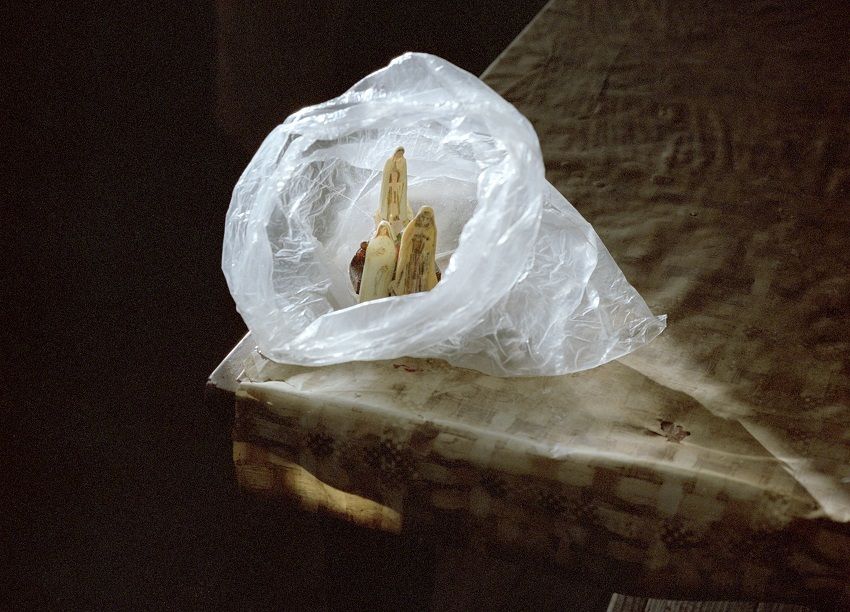
From ‘Bone Foam’ © Maria Oliveira
Maria Oliveira’s work is based upon her personal experiences. Her artist statement talks about being interested in creating work about both “physical and mental umbilical places”. The term ‘liminal’ is a good term – but something about the word ‘umbilical’ being used in artistic context intrigues me. Oliveira’s work featured in Issue 116, from her ongoing project ‘Bone Foam’, illustrates her poetic desire to explore things visible and invisible, their connections found somewhere between reality, memory and imagination.
Cary Benbow (CB): Please explain the idea behind your portfolio submitted to this issue – how does it relate to your other projects, or how is it significantly different?
Maria Oliveira (MO): ‘Bone Foam’ is an ongoing project that I’m developing from the family universe of Alto Minho, in Portugal. In this body of work, we find life and death, and the movement that exists between them, In balance.
Earth, bodies, water, animals and fire in strict proximity. I am interested in the idea of communion. Also, the feminine universe, the woman who generates, creates, cares, kills and feeds. The management of cycles and the earth that is touched with the whole body.
This project is connected with my previous ones. I am trying to reflect and question the place of the human being as part of nature; one, complex, cyclical. Inevitably, fragile, violent and inexplicable. Part of it, not a spectator.
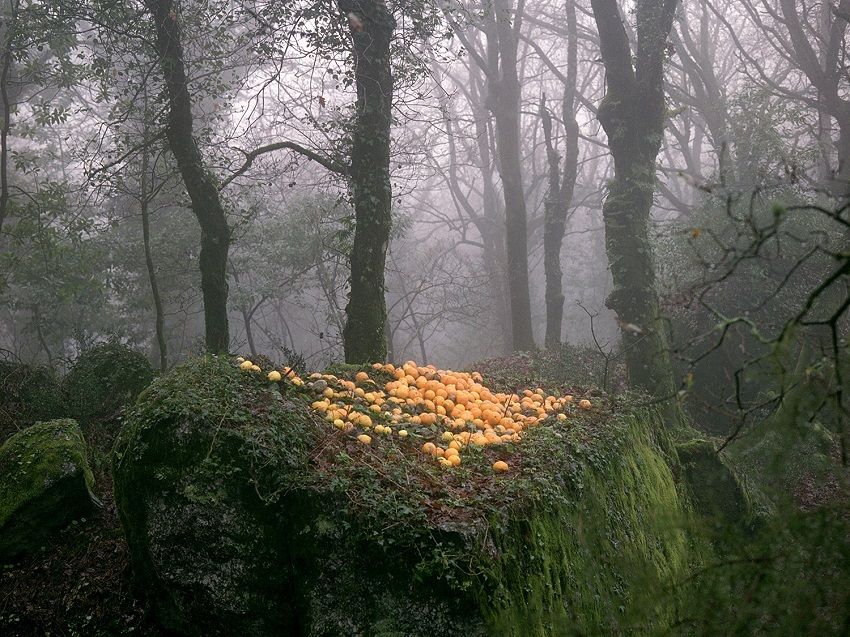
From ‘Bone Foam’ © Maria Oliveira
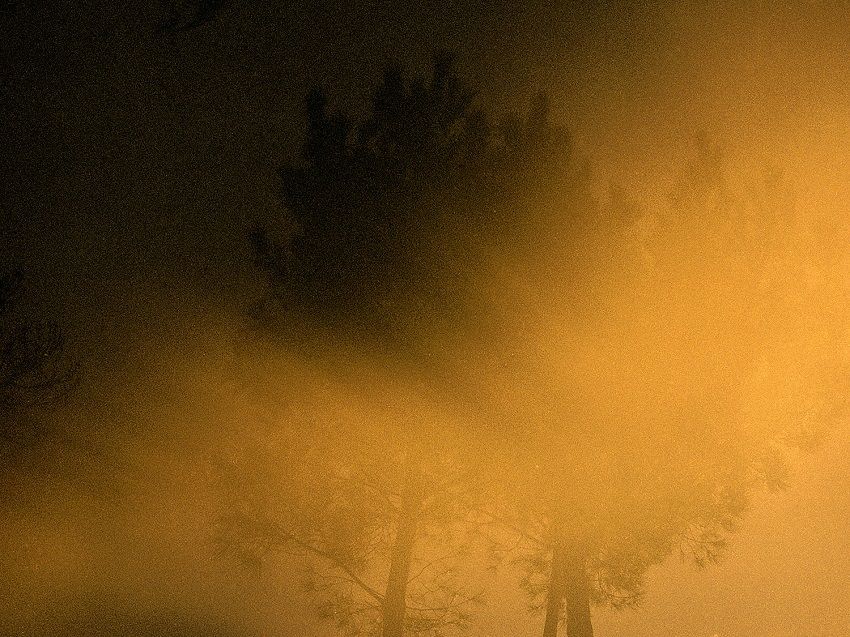
From ‘Bone Foam’ © Maria Oliveira
CB: What or who are your photography inspirations – and why?
MO: There are many people who specifically influence me. And there, right beside photography, films, music, and books (especially poetry, which feed my imagination), I find a kind of company of inner neighbors.
CB: What is your main source of inspiration? What kind of stories do you wish to tell with your work?
MO: For this work, the main inspiration is my own experience. Besides having grown up in a rural environment surrounded by mountains, fields, fog, and animals, this universe continues to have a strong presence in my life.
Death is habitual, natural. The life that precedes it changes according to the cycle of the seasons, the winters are immense and empty, and the days change radically with the rising of the sun, I mean, the light, the energy of the animals, our energy. Fire is also quotidian, a necessary instrument. The same with food, that presupposes death.
Furthermore, in this place, but not exclusive to it, exists the belief that certain women have the premonitory ability to predict death, receive signs, communicate with ancestors and the ones that are no longer alive. The woman plays a fundamental role in feeding the living beings and preparing the dead. All these experiences, stories, things told or lived, symbolic or real, imagined or repeated until they become the true flow into this project.
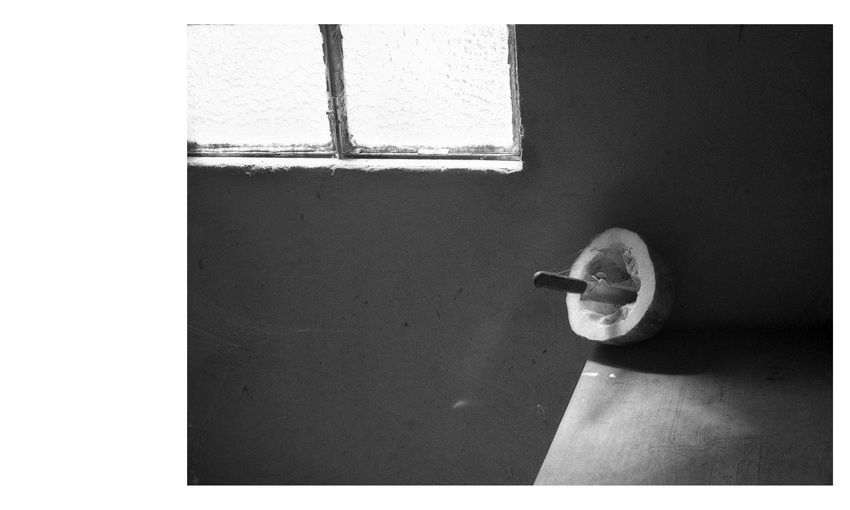
Osso Espuma © Maria Oliveira
CB: Who are the people that appear in your photographs? Are they literal people, or do they represent something more important than just being a figure?
MO: Most of the time it is me, sometimes my mother, rarely other people. There are several reasons. A practical reason is because I prefer to shoot alone. It gives me more freedom and more focus, the solitary movement of searching and building. Obviously, it also has constraints. When I work with other people, it has to be someone I feel confident and comfortable with. Energy is very important. Normally I photograph almost only women, but I don’t have a concrete justification for this.
CB: There are elements of nature, wildlife, landscape, and poetic exploration of memory in your work. Why do you choose to depict these elements in the way you do?
MO: It’s what I’ve been interested in working on, it’s not really a choice. It’s where I feel I want and need to be. I am always interested in the less obvious, the layers that accumulate in what we consider to be reality, where imagination also fits. That imprecise place where imagination blends with the world has always fascinated me. Also, memory is important both as an anchor and as a guide to the future.
There is a need to stay close to the real things. Be it feet on the earth, the fire, the water.
There is poetry inherent in all that cannot be explained, in that which is beyond us, or that we do not yet understand… In what we feel as primordial, honest, free. Even if violent or dramatic, it is authentic.
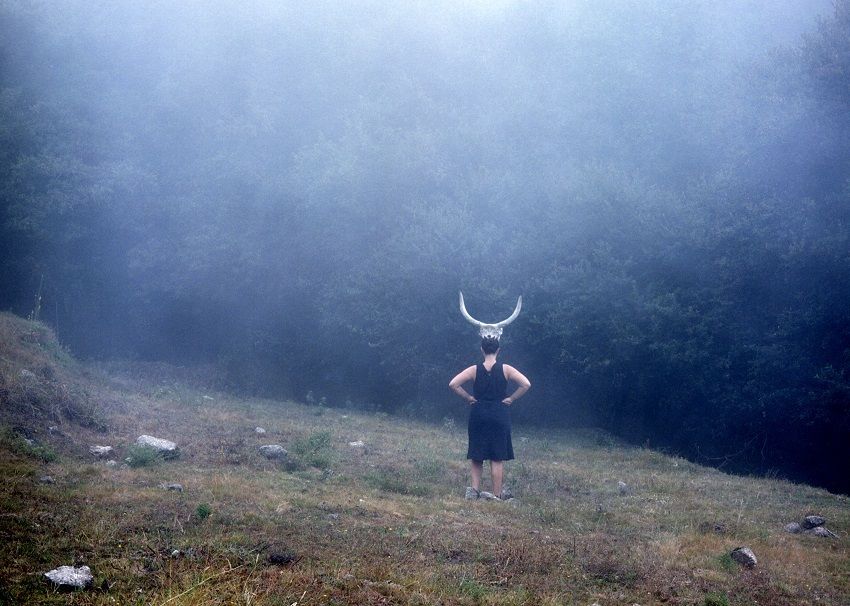
From ‘Bone Foam’ © Maria Oliveira

From ‘Bone Foam’ © Maria Oliveira
CB: Your work is specific to your life in Portugal. Do you feel your work makes a comment on a universal level, as well as the personal level?
MO: Yes, I think it is universal and not specific of Portugal. I just use these places as a tool because they are close to me, and I know them intimately. But the issues are universal. What I try to say is universal.
CB: Do you keep notes or write about ideas or themes within your work? If so, would you share a meaningful entry?
MO: Yes, always. Essentially, I write. I also draw or make collages, and carry objects with me. I like to connect the time spent with objects I’ve kept from my family with what I write or photograph now. Everything keeps me company, feeds me, and helps me define the path ‘Rearing Home’ is a kind of journal. You can read it here: https://mariaoliveira.pt/Rearing-Home
::
Maria Oliveira was born and raised in Ponte de Lima, and lives in Porto, Portugal. Based on her personal experiences, she has been interested in work about these physical and mental umbilical places – exploring its mutation, and the relations between people and nature in a close coexistence. She is interested not in its documentation, but in a poetic approach – working between the visible and the occult. Between reality, memory and imagination.
Location: Online Type: Featured Photographer, Interview
One response to “Interview with photographer Maria Oliveira”
Leave a Reply
Events by Location
Post Categories
Tags
- Abstract
- Alternative process
- Architecture
- Artist Talk
- artistic residency
- Biennial
- Black and White
- Book Fair
- Car culture
- Charity
- Childhood
- Children
- Cities
- Collaboration
- Community
- Cyanotype
- Documentary
- Environment
- Event
- Exhibition
- Faith
- Family
- Fashion
- Festival
- Film Review
- Food
- Friendship
- FStop20th
- Gender
- Gun Culture
- Habitat
- Hom
- home
- journal
- Landscapes
- Lecture
- Love
- Masculinity
- Mental Health
- Migration
- Museums
- Music
- Nature
- Night
- nuclear
- p
- photographic residency
- Photomontage
- Plants
- Podcast
- Portraits
- Prairies
- Religion
- River
- Still Life
- Street Photography
- Tourism
- UFO
- Water
- Zine

[…] immediately reminded me of the work of another Portuguese photographer featured in F-Stop Magazine, Maria Oliveira. Costa’s poetic and symbolic exploration of intangible emotions are expressed beautifully and […]